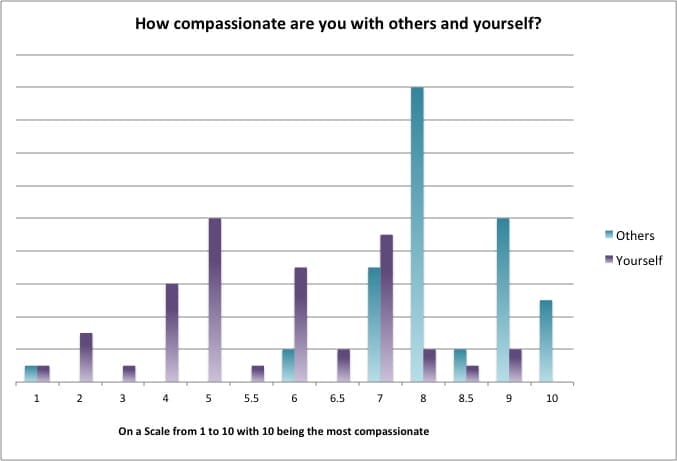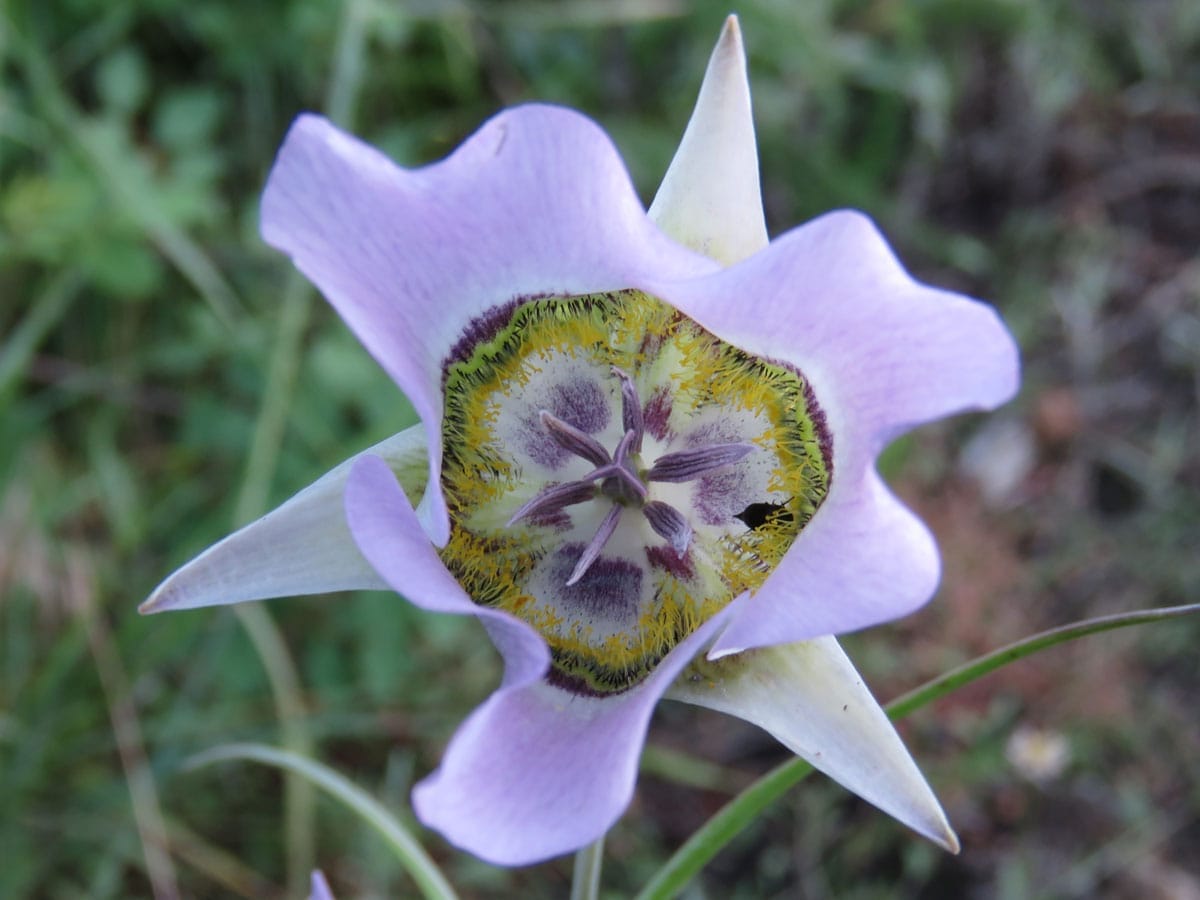Are You Good at Being Compassionate?
Discovering Your Capacity for Being Compassionate
About two years ago I added two questions to my intake form for new clients. I put the questions on my intake forms to learn more about each individual client and how she sees herself. The plan was to garner information from how these questions were scored and use it to tailor the content of conversations to best help each person. Here are the questions:
- On a scale of 1 to 10 how compassionate are you with others?
- On a scale of 1 to 10 how compassionate are you with yourself?
You may want to take a minute to answer these questions yourself. For reference, 10 is the most compassionate and 1 is the least. Do you answer these questions quickly using a gut reaction or do you deliberate over them, concerned about what someone else might think if they saw your scores?
What is Compassion?
In the Merriam-Webster dictionary compassion is “a sympathetic consciousness of others’ distress together with a desire to alleviate it” and a “feeling of wanting to help someone”. It means to suffer together. I often see the word simply as “with passion” or being “with feeling”.
Compassion is something intangible that is hard to measure like love or kindness and it is relative to each person, but it is worth considering your own capacity for being compassionate. Do you simply tolerate other people’s pain or are you the kind of person that falls into it with them? Are you able to sit with another person who’s in distress and be a companion for them offering comfort in a way that helps? Spending time describing your capacity for compassion is a good exercise to do on occasion. It is worth noting the times you are compassionate and the times you aren’t.
Compassion for yourself is called “self-compassion” and it means a willingness to be with your own suffering and to want to alleviate your own pain. Dr. Kristin Neff has done a fabulous job of mapping out the intricacies of self-compassion on her website self-compassion.org.
Compassion leads to connection and gives substance to our lives. Many people include compassion as one of their values and they strive to learn more about being compassionate.
What Happened with These Questions?
What I ended up discovering is that the answers to these questions were incredibly tough to predict and even harder to understand. As an outsider looking in, I was continually baffled by the answers. The responses were not what I would have guessed even after getting to know the clients.
A little kept secret of mine, is that for each individual session, these answers are have little, if no, bearing on how I guide the process. Yet for some reason I left the questions on my forms even after numerous revisions sensing that there was something there I had yet to discover.
I’d like to say thank you to all the clients who have taken a moment or two to consider these questions. You may not have liked answering them or thought they were kind of frivolous. I think now is when you have the opportunity to benefit from that time you took.
My Survey Results
Over time, I’ve noticed a consistent trend among the scores that clients sent me. The scores for compassion for others was nearly always higher than the scores for self-compassion. Just this week, I decided to tally up the data I have to date and see what else I could learn from this impromptu survey. Here’s what I found:
- 87% of clients who answered the questions had more compassion for others than themselves
- 13% of clients had the same amount for others and themselves
- ZERO clients had more compassion for themselves than others
- The average self-compassion score was 5.5 compared to the average compassion for others score of 8.0
Here is a graph of the relative results to give you a visual. You can see that overall people felt they were better at being compassionate towards others.

Cultivating Self-Compassion
Far from a rigorous scientific study, my simple, small survey will not win any notice among psychologists I’m sure, but that’s not the point. The point is there is an obvious trend here that many people can learn from.
From my outside perspective, my clients are some of the most self-compassionate people I know. They are not only aware of their suffering, they are willing to be vulnerable in sharing about it. They are so committed to alleviating their own suffering that they are willing to dedicate generous amounts of time and energy to getting better. But, since they are on the inside looking out they can’t see the heroism of their own efforts. Taking a moment to step outside yourself to look in will help you see how much you’re really doing.
Do you know the saying that we are our own worst critic? It may be that many people have bought into this mythology, and although it may be true it doesn’t help us work towards alleviating our own suffering. Next time you catch yourself thinking or saying that, go ahead and replace it with a compassionate statement such as, “I’m my own best companion.”
To have more self-compassion, we need to apply the compassion we give to others to ourselves. Clearly with an average score of 8 when it comes to being compassionate with others, we know about being compassionate. Learning how to befriend yourself can help you up your self-compassion score.
If you are a person that feels you are better at being with the distress of others than your own pain, this data should help. Dr. Kristin Neff says that a component of self-compassion is “common humanity” and knowing you are not the only person struggling. It is quite a layered thing to realize that you are not alone in feeling of you have a deficit of self-compassion and that this will help your sense of self-compassion.
Take some time each day to acknowledge all that you do to take care of yourself. You may do twice as much to beat yourself up as you do to help yourself out, but beating yourself up over that isn’t going to help. Focus on the ways you do know how to love yourself and do one new thing, no matter how small, to nurture you.
About Author, Stacey L. L. Couch
 Stacey L. L. Couch, Certified Shamanic Practitioner, works as a Spiritual Director and is the author of Gracious Wild: A Shamanic Journey with Hawks. She empowers people with the ability to explore life’s big questions by calling on nature, story and synchronicity as a source for guidance and healing. With her deeply rooted experience in the field of shamanism and passion for working with wildlife and rescue animals, Stacey has a unique blend of rational and mystical perspective that makes the matters of the soul easily accessible to others. She values mindfulness, wonder, and compassion in her daily spiritual practice. Learn More About Spiritual Direction.
Stacey L. L. Couch, Certified Shamanic Practitioner, works as a Spiritual Director and is the author of Gracious Wild: A Shamanic Journey with Hawks. She empowers people with the ability to explore life’s big questions by calling on nature, story and synchronicity as a source for guidance and healing. With her deeply rooted experience in the field of shamanism and passion for working with wildlife and rescue animals, Stacey has a unique blend of rational and mystical perspective that makes the matters of the soul easily accessible to others. She values mindfulness, wonder, and compassion in her daily spiritual practice. Learn More About Spiritual Direction.












thanks, stacey. that is very helpful. i am catching my self judgements sooner and allowing more self compassion. interestingly, in the abstract i’m about equal re others and myself, but in practice, at least when i’m working with someone i do want to help relieve their suffering more than i pay attn to my own needs. however with this prolapse issue and the need to not stand while working i’m changing that, my posture and self care have improved so much. still not out there asking for work, grateful when it appears. still not wanting to be with groups or any situation where i can’t just lie down and let things get back into place easily. accepting that and know that eventually my enjoyment of healing work and being with people will surface again and i will hopefully maintain my self care and compassion. you phrased it all well, thanks. love, anna
Dear Anna, With deep appreciation for your willingness to share your process, I send my wishes for your continued healing and gratitude for all you do for others. Much love, Stacey
love this! Thanks Stacey 🙂 very insightful and clever of you to spot this trend!
You are welcome Samantha! I’m glad you enjoyed this too.
Here is a poem that speaks to self-compassion – Wild Geese by Mary Oliver
Wild Geese
You do not have to be good.
You do not have to walk on your knees
for a hundred miles through the desert, repenting.
You only have to let the soft animal of your body love what it loves.
Tell me about despair, yours, and I will tell you mine.
Meanwhile the world goes on.
Meanwhile the sun and the clear pebbles of the rain
are moving across the landscapes,
over the prairies and the deep trees,
the mountains and the rivers.
Meanwhile the wild geese, high in the clean blue air,
are heading home again.
Whoever you are, no matter how lonely,
the world offers itself to your imagination,
calls to you like the wild geese, harsh and exciting-
over and over announcing your place
in the family of things.
Dana, That is my favorite of Mary Oliver’s poems. Thank you for sharing it with everyone. It does so strongly speak of self-compassion and brings much solace. Many Blessings, Stacey
Hi Stacey.
Tough one, because personally I tend to conflate self compassion with self pity, and the spirtual path calls for self examination and all of this calls for self discernment… Whew! So much self stuff!!
The saying that helps me put things in perspective sometimes is by a Native poet which I paraphrase:
“Sometimes I go about pitying myself when actually I am being carried by a Great Wind across the sky..”
With those geese maybe? Feeling deeply loved by the Universe and knowing you have a beautiful and meaningful place in the order of things helps tremendously… It is one of the great gifts of a life graced by Shamanic practice, for which I am so very grateful..love to all..Karen
Hi Karen, Yes! Self-compassion takes on a completely different challenge when placed in a deep spiritual practice. There are so many instances where we can take the call to be humble as an excuse not to care for ourselves. It is a thin line to walk, but worthwhile none-the-less. I love the saying that you offered us. Wonder in the Great Wind is a stunning form of self-compassion. Love to you, Stacey
Hi Stacey,
Just read your article today and today was the right day for me to read it. I have been struggling of late, and needed
the reminder to be my own best companion as well as my own best supporter! I am good with self care, as it is my profession, but I am not good at recognizing that I am, or acknowledging that I am human and imperfect and that it is ok. Too much pressure to always feel “good”.
Thanks for the gentle prompting. Love your writings.
You are welcome Susan. I am glad synchronicity brought you to exactly what you need when you needed it. Many Blessings, Stacey